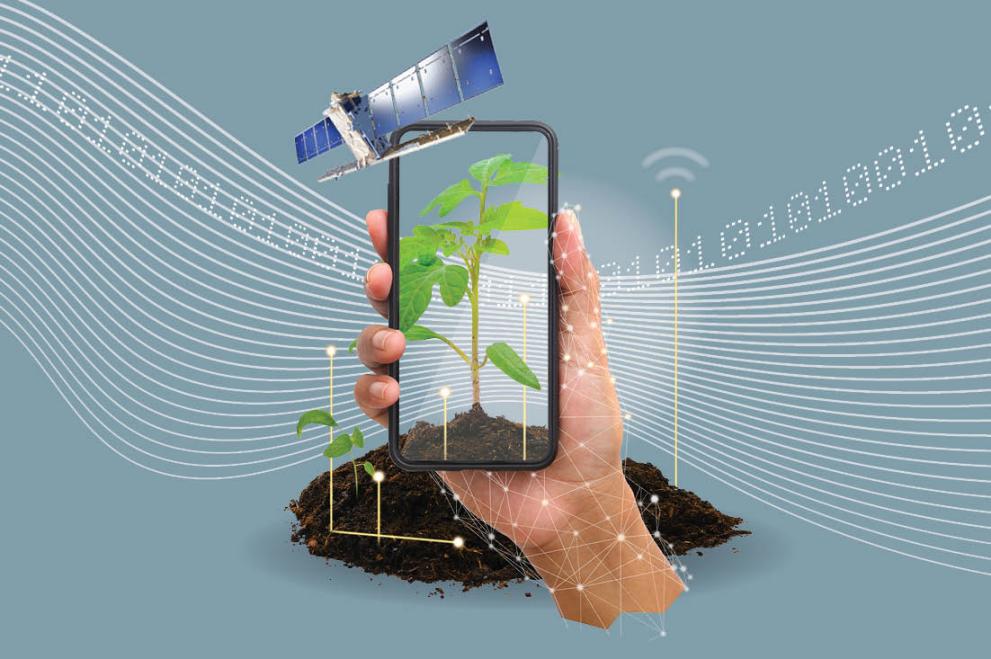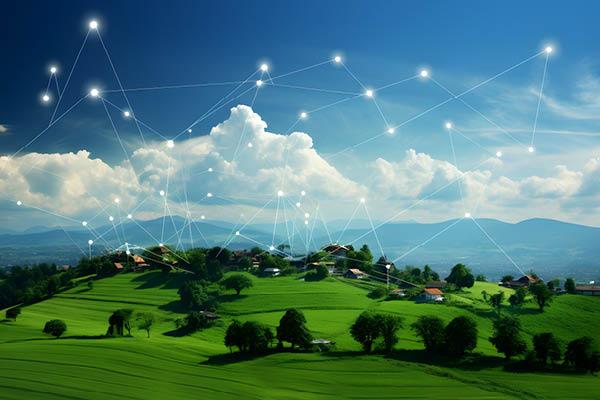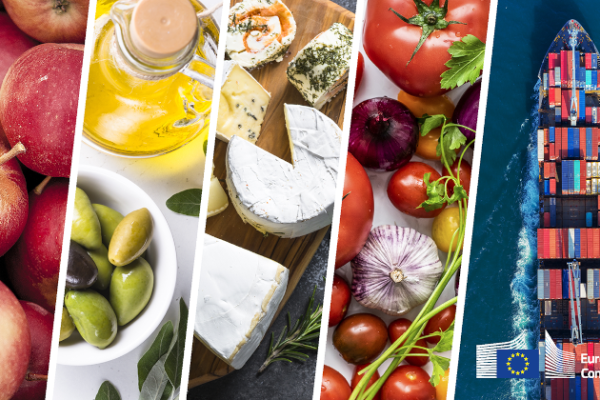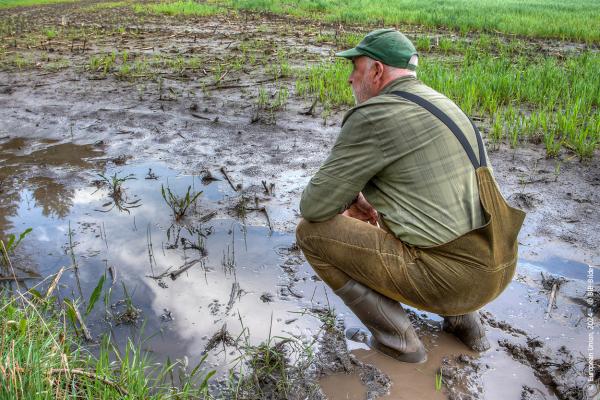Overview
The digitalisation of agriculture and rural areas in the EU supports the modernisation, competitiveness, and sustainability of agriculture. It fosters the integration of digital technologies and data-driven approaches, all while enhancing the well-being of rural communities.
Digitalisation includes the uptake of digital technologies by farmers and rural communities together with improved access to knowledge and training. It also means the modernisation of the sector in terms of infrastructure and governance.
Agri-Digital Conference
The EU Agri-Digital Conference fostered discussions on progress, policies, and the future role of digitalisation and data in agriculture and rural areas.

This JRC report on digital transition explores the interplay between digital transition, policies and the resilience of the agricultural sector and rural areas, against the backdrop of potential disruptive and transformative changes.

- News article
Explore how the digital transition can bolster the resilience of agriculture and rural areas amid future disruptions.
Agriculture and digitalisation
Digitalisation is one of the cornerstones of the European Commission’s priorities. The EU’s digital strategy will empower people with a new generation of technologies, including farmers and rural communities.
The digitalisation of the European agricultural sector will have a transformative change both for the EU’s farming sector and for rural areas. Digital and data technologies have the potential to revolutionise agriculture by helping farmers work in a more efficient and sustainable way.
With the collection and processing of information, technological automation and robotisation, they can contribute towards a more sustainable agricultural production. They can increase the efficiency and competitiveness of the farming sector, while lowering its environmental footprint. Digital technologies can also contribute to the development of rural areas by providing better accessibility and connections in line with the Long-Term Vision for the EU’s Rural Areas.
Digital technologies can act as enabling tools for all common agricultural policy (CAP) specific objectives, particularly for economic, environment, climate, and rural-related objectives.
By creating a conducive environment, the European Union works on a human centred digitalisation. This will close the digital divide between the urban and rural areas and enable farmers and rural communities to take up and effectively use digital technologies.
The CAP and digitalisation
A key objective of the CAP 2023-27 is to modernise agriculture and rural areas through fostering and sharing knowledge, innovation, and digitalisation.
The CAP promotes a comprehensive approach towards digitalisation for agriculture and rural areas, not only at farm level but also for the modernisation of the administration. For the first time, EU countries have designed digitalisation strategies as part of their CAP Strategic Plans, facilitating the advancement of digitalisation in agriculture and rural areas. These strategies are tailored to the unique situation of each country. They explore the potential of digital technologies to align with CAP-specific and cross-cutting objectives and identify the requirements for promoting the adoption and sustainable use of digital technologies.
EU countries also work towards finding mutual benefits with other policy instruments and actions, ensuring a holistic approach to digitalisation. Building on the portfolio of CAP measures at their disposal, EU countries strategically promote digitalisation, focusing on critical areas such as infrastructure, training, skills development, and the uptake of advanced technologies, including precision farming.
CAP tools for digitalisation
- Investments, for instance for broadband or the installation of digital technologies in agriculture, forestry, and rural areas, such as investments in precision farming, smart villages, rural businesses, and information and communications technology infrastructures like broadband.
- Eco-schemes and agro-environment-climate commitments to support precision farming technologies optimising input use.
- Sectoral interventions to purchase digital technologies at any stage of the supply chain, including knowledge exchange or monitoring of products’ quality.
- Farm advisory services on digital aspects in agriculture and rural areas, including the use of a Farm Sustainability Tool for Nutrients.
- Cooperation to prepare and implement EIP operational groups, local development, and Smart Village strategies, as determined by EU countries.
- Knowledge exchange and information: support training for digital skills, increase awareness and knowledge on digital technologies, and promote exchange of experiences with digital technologies (e.g. demonstration farms).
Overall, more than 274 000 farms are to be supported by digital farming technology to better adapt to new technical developments.
Digitalisation of public services
Digitalisation of public services has been a key priority in the European Union and the COVID-19 pandemic has accelerated the sense of urgency.
The modernisation of CAP implementation and governance aims at enhancing the efficiency of CAP administration and monitoring while reducing the administrative burden for final beneficiaries.
The Integrated Administration and Control System serves as the central technical component for the financial management and monitoring of the common agricultural policy. The online pre-filled aid applications simplify the application process for farmers, reducing administrative complexities and improving accessibility to support mechanisms. At the same time, the integration of satellite imagery and geotagged photos enables more precise and reliable data collection.
European data strategy
A vast amount of data is generated daily from our digital activities, including in the agricultural sector. This holds great potential for economic growth and for addressing societal challenges.
The European data strategy aims to establish a single market for data, promoting competitiveness and data sovereignty. It will encourage data altruism, particularly in Internet-of-Things-generated data, which is crucial for advanced farming technologies, such as precision farming. The Open Data Directive and Act on High-Value Datasets also support data reuse. These regulations affect data sharing in agriculture and the development of a common data space for agricultural data.
A common European agricultural data space
In the European strategy for data, the European Commission announced that it will work towards a common European agricultural data space. This data space should facilitate trustworthy pooling and sharing of agricultural data between private stakeholders and public authorities.
Funding opportunities
Research, innovation and capacity building
The EU supports research and innovation on agricultural and rural digital transformation.
Horizon Europe and the Digital Europe Programme are pivotal in providing innovative digital solutions while also empowering farmers to effectively utilise these technologies. These ongoing research projects and initiatives (PDF) collectively form the cornerstone of the EU's digital agricultural transition, driving sustainability, competitiveness, and progress in the sector.
Looking into the future
How will digitalisation impact the lives of farmers and rural communities in the future?
Together with European Commission’s Joint Research Centre, a foresight study on ‘Long-Term Implications of the Digital Transition for Farmers and Rural Communities’ has been conducted to help us shape the vision for the digital transition.
The final report was published during the Agri-Digital Conference at the EU Agri-Food Days on 8 December 2023.


